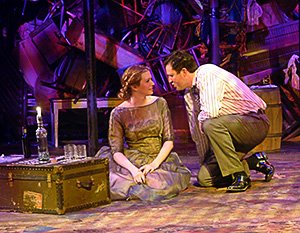THEY LIKE US; THEY REALLY LIKE US
Glowing reviews for the show I'm doing just keep pouring in...
From the New Orleans Times-Picayune:
A '10' FOR 'TENNESSEE'
Pearls before Swine Palace audience in Baton Rouge
Lightning streaks across the sky as thunder and fearful storm sounds are heard.
Gradually, the lighting comes up on the detritus of what Tennessee Williams called "the most splendid city in the world."
The stage is dominated by the elevated, outsized, tattered head of the Rex jester, as emblematic of loss as the Statue of Liberty in the original "Planet of the Apes." The piles of rubble include louvered shutters, the stripped chassis of a car, a dressmaker's dummy, piles of chairs, an ornamental fountain cracked in half and the inevitable refrigerator.
In "Tennessee Williams in QUARTER Time," the playwright and his characters appear in excerpts from his plays, poetry, letters and essays that summon the actual and emotional storms that wind through his work.
Tempests appear in his plays as early as 1937's "Spring Storm" and as late as 1982 in "A House Not Meant to Stand." John Dennis, director of the master of fine arts acting program at Louisiana State University, wanted to do a Katrina-influenced Williams collage that would highlight Williams' "deep-rooted connection to the Gulf Coast and his beloved New Orleans," seeing his vulnerable heroes and heroines as "evacuees from their surroundings."
The result is a masterful mosaic of Williams' words and themes, providing a topical overlay and evocative subtext.
Click here for the rest.
And from the independent student-run newspaper the Tiger Weekly:
Remembering Tennessee
But the utmost credit must be paid to Director John Dennis. He truly captured this production with every aspect. The thematic elements seen throughout added to the personification of Williams and his work. The gritty, raw and dirty set design, combined with the tattered, muddy costumes the actors dawned, was as reminiscent of New Orleans as are the extravagant characters Williams brought to life through his poetic imagery.
Dennis and the entire cast and crew of this production did their homework. They found the voice, tone and candor of such a prominent playwright. And that is no small task to take on.
Whether you know everything or nothing at all about Tennessee Williams, I have no doubt that you will enjoy this production.
Click here for the rest.
I think this production is really striking an emotional chord with local audiences. It feels like most of the rest of the country has put the destruction of New Orleans on the back burner. But here in Baton Rouge, we're thinking about it every day--obviously, it's not in our face the way it is in the Big Easy itself, but it's still the biggest story in the news here, still the most widespread topic of conversation. It's painful, this collective angst, this feeling of loss that just won't go away, this sense of abandonment. It really blows me away when I meditate on how our little collection of Williams scenes inspired by his time in New Orleans offers our audiences a real experience of catharsis in the ancient Greek sense.
We finish the show with a quick two-part dance routine. It opens with the entire cast entering from waaay upstage, moving in spasmodic jerks like zombies, to a groovy bass line. As we approach the audience, we encounter Mardi Gras beads on the floor and slowly put them on. Then the music breaks into a traditional New Orleans jazz tune, and we begin to joyfully move in Big Easy style, concluding our trip downstage with a mass free form dance near our viewers. This has been getting a spontaneous round of applause lately: a shared celebration of the once and future New Orleans, the eventual triumph of reconstruction. It's almost as though you can feel the audience thinking "Right on!"
For me, this is what the theater is all about, indeed, what art is all about. I've written at great length about how I believe that all art should possess an ideological component, and this show certainly does do that, albeit subtly. But Quarter Time, I think, ultimately transcends all that, cutting directly through to the human soul, serving to heal the tattered psyches of Louisiana that have been beaten down by both Mother Nature and incompetent human leadership.
You know, the more I think about it, the more proud I am to be along for the ride.
Andrea Frankle (Blanche) and Joseph H. Chrest (Mitch) performing “A Street Car Named Desire”
$$$$$$$$$$$$$$$$$$$$$$$$$$$$$$$$$
Friday, February 10, 2006
Posted by Ron at 11:18 PM
Subscribe to:
Comment Feed (RSS)
















|